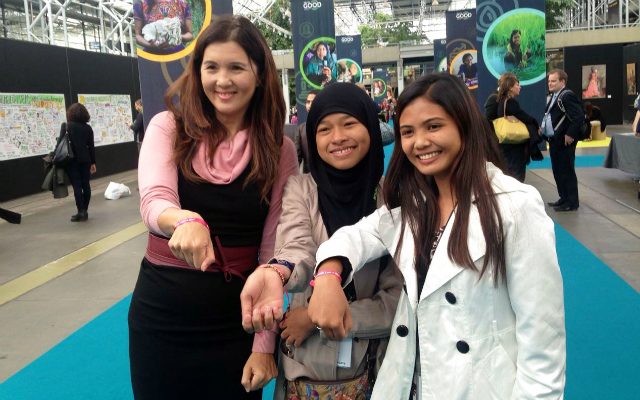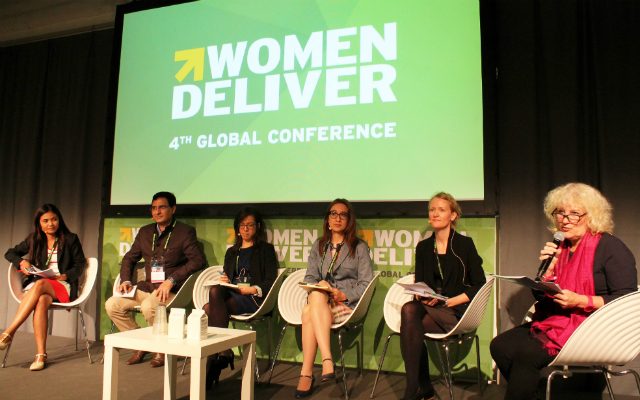SUMMARY
This is AI generated summarization, which may have errors. For context, always refer to the full article.

MANILA, Philippines – In a conference attended by high-ranking global leaders, the voices of two young Filipinas stood out.
From May 16 to 19, their experiences and passion to make a difference carried 19-year-old Rosie and 16-year-old Fahada to the 4th Women Deliver Conference in Copenhagen, Denmark. Their goal was to help drive discussions and solutions needed in order to achieve the Sustainable Development Goals (SDGs) for young women, especially those in conflict areas.
The Women Deliver Conference is the largest gathering of policy makers, advocates, and members of civil society and business leaders in a decade for girls’ and women’s rights, health, and well being, following the launch of the SDGs – our shared vision of where we want to see the world to be in 2030.
Rosie and Fahada strived to become the face of the figures and statistics being tossed around during the policy discussions at the conference attended by almost 170 countries and more than 5,000 individuals.
Following a 12-month empowerment program spearheaded by Plan International, the two girls were chosen to represent their peers at Women Deliver. Rosie campaigns on issues such as girls’ rights, education in emergencies, teenage pregnancy, and violence while Fahada is keen to raise awareness about violence, inequality, and barriers to education.
First-hand experience
Hailing from Zamboanga City, both have first-hand experiences in armed conflict during the siege in 2013 when armed rebels took hold of the city for almost three months. The conflict affected more than 100,000 civilians who were forced to take shelter in evacuation centers.
While the conflict spared no one, they learned that it disenfranchised women and children the most, making them more vulnerable to various forms of violence and sexual abuse.
“Hindi pa talaga ako socially-aware before. After ng siege na yun, nakita ko na maraming issues ang mga babae sa barangay namin,” Fahada shared. (I wasn’t socially-aware before the Zamboang siege. The siege made me see that there women in my community face many issues.)
Aside from being forced to leave their homes and take refuge in evacuation centers, Rosie and Fahada experienced skipping classes for 3 long months.
According to the United Nations Population Fund (UNFPA), global experience shows that about 2% of women aged 15 to 49 years old who are in an emergency situation are at an increased risk of gender-based violence. A 2014 United Nations study on indigenous women and girls said that such experiences could leave “immediate to long-term multiple physical, sexual and psychological consequences on victims.”
This is true, according to Rosie and Fahada, after hearing various stories about girls who were either raped or forced into teenage pregnancy and child marriage during and even after the three-month siege.
As soon as classes resumed, Fahada shared that she eventually learned about what happened to her friends who no longer returned to school.
“May dalawa akong kaibigan na magkaiba ng kwento pareho ang siang pinatunguhan— may anak sila ngayon,” Fahada shared. (I have to friends who have been through different things but share the same story ending – they are both mothers now.)
Empowering each other
These were the kind of stories that the empowered young girls imparted during the Women Deliver conference.

In Copenhagen, they knew that they are not only representing the Philippines, but also their friends and hundreds of other teenage mothers and victims of violence during conflict.
Rosie, for her part, joined a panel on education during emergency.
“We have to make schools safe in order to get children, especially young girls, into school. The peace building process has to be in place for these areas so that children don’t have to be afraid to go to school,” Rosie said during the panel discussion.
As the one of the youngest delegates in the Women Deliver, Rosie learned that it is not easy to become an advocate. Despite this, Rosie and Fahada are nothing short of inspired after participating in the various conversations they took part in. But what drove them to persevere harder in the advocacy was knowing that women are not alone in their struggle to close the gender gap.
“I was inspired to see men in the conference. I learned that both men and women can work (together) for the rights of everyone,” Rosie said in Filipino.
Among the thousand other participants of Women Deliver were former Australian Prime Minster Julia Gillard, Melinda Gates, Philippine Senator Pia Cayetano, Population Services International President Karl Hoffman, and distinguished professor Michael Kimmels.
Continuing the fight

Their advocacy does not end as they come home to the Philippines. While they are young, Fahada believed that they are as powerful as the global leaders they had the chance to brush elbows with in terms of making a dent in their collective struggle to uphold the rights of women.
“Natutunan ko na dapat hindi kami dumepende sa mga world leaders. Dahil kami ang may-ari ng advocacy at kami ang may karanasan, dapat kami ang nagbibigay ng motibasyon at magbigay ng action,” Fahada said. (I learned that we should not depend on world leaders. Since we are the owners of our advocacies, we should take the lead in influencing others and acting on the issues.)
Aside from going back to school and finishing their studies, Rosie and Fahada plan to hold summer camps geared on empowering young Filipno women and teenage mothers within the next months.
The young Filipinas also promised to keep the country’s leaders accountable by closely monitoring the progress of the SDGs to “ensure that the SDGs will be achieved in the near future.” – Rappler.com
Add a comment
How does this make you feel?
There are no comments yet. Add your comment to start the conversation.